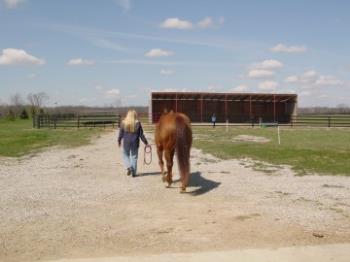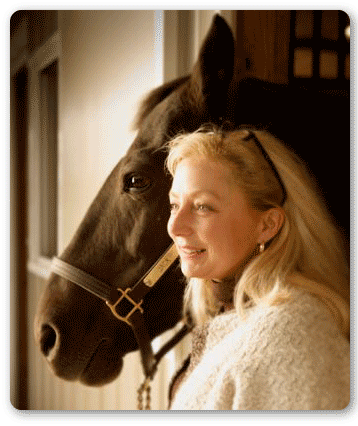Gravel In My Barn Shoes

As we are like every other horse owner, our barn is not finished, fence needs to be built, and I have a long walk to the pasture to bring my group of 5 back to their cozy stalls. Eventually, my turn out walk will be a lot shorter. With the new pasture we will be building, the walk will be cut in more than half, and I cannot wait because every time I do turn out, I get that loose gravel in my barn shoes.
Usually, I try to take in two horses at a time. One almost always walks a bit closer than I like, and the gravel starts to work its way down my socks. It stays at the most uncomfortable place it can go until I finally get my horses into their stalls and I do the "jiggle dance" to move it down in my shoe. Better yet, I go through the process of getting that shoe off and getting the gravel OUT! Until I go to get the next one or two horses. Thankfully, I can change my irritating dilemma. However, if I reverse the situation, my horse cannot just speak to me and tell me if he has an irritating situation. I've thought about some of the things we may forget to do that can help make our equine friends more comfortable in the summer. Try some of these, and maybe you won't see your horse doing a ''jiggle dance'' as often.
Combat the flies / save horse's hoofs, fences and stalls.
Not only are flies pests to your horses skin, but they also can lead to other problems. Although stomping helps your horse get rid of flies, it also takes a toll on his feet. Chipping and cracking can become a problem, causing higher farrier bills. Use fly spray and fly deterrents, along with hoof ointments to help to keep his feet in good condition. Make sure you have your farrier visiting on a regular basis. He/She can tell you about good products that will help to keep the shoeing bills lower and hoofs in good shape.
Another important part of using fly sprays and deterrents is that your fencing, stalls, or containment will last longer. Itching, scratching, kicking and laying on fence lines and stalls due to insects creates high traffic areas and will cost you more in maintenance. Be sure to watch for signs of wear. By combating the flying pests, you save money in the long run and your horse will be happier. Incidentally, he won't be so tired from the work out he's already had in keeping flies away. Investing in an automatic fly control system for your barn will work wonders. Because you can set the timer to spray several times each day, it takes the guesswork out of running the system. These systems interrupt the breeding cycle of insects, so the number of flies and mosquitoes around your barn will be greatly reduced.
Use Terra-Sorb to keep dust down in you indoor and water as needed.
If you have access to an indoor arena, be sure it is in good shape when you ride. Excessive dust not only affects your horse, but it can also cause serious respiratory problems for both of you in the long run. If you cannot use dust-down products, water the arena before you ride. Use a wide-range yard sprinkler and move it down the indoor so that puddles don't form. Additionally, condition the arena to avoid uneven footing. Your horse has to compensate more for your weight on uneven ground, causing sore muscles for him. A track and ring conditioner will not only turn your soil, but also make it level, even in corners. The pitch and angle on the track and ring conditioner can be changed, giving you the most ability to improve your arena. When riding, be sure to work your horse on both the left and right sides for an even work out. Always cool your horse to avoid possible colic or tying up.
Water, water, water.
One of the most important elements for a horse during hot weather is water. If you horse is knocking his bucket down in his stall, then he is definitely asking for more water. Consider using two buckets with bucket holders. The holders help to keep buckets in place, rather than getting knocked off the wall and stepped on by your horse. Ultimately, you may want to choose automatic waterers that provide water on demand. Automatic waterers are made for stalls and pastures. Be sure to check them regularly and clean the bowls year-round. If you are unable to use waterers in pasture, use larger water troughs and check to be sure clean water is available at all times.
Brush and groom you horse well before riding.
Dirt particles can irritate your horse's skin. This is especially true in warm months when dirt mixes with sweat on your horse's body and dries to form a crust. Be sure to use clean saddle blankets, along with proper fitting bridles, bits, girths and cinches. Check to be sure your horse does not have any rubbed areas after riding by grooming again after your ride. During hot weather, a cool wash down will feel good to your horse and help remove any build up of sweat and dirt that can accumulate. Always use a sweat scraper to remove excess water.
Pick your horse's feet.
It sounds elementary. However, grains of gravel can travel through the hoof, causing irritation or even an abscess. Your horse will be off, and sore. Again, another vet or farrier bill can be avoided by this simple task.
Remove manure out of stalls, and drag pastures.
Keeping stall areas, and sheds free of manure will help to keep relentless flies at bay. Cleaning stalls daily will make each mucking time shorter, and will also help flies from congregating inside your horse's stall. Drag pasture areas with a track and ring conditioner to knock down the piles that form. If you dispose of manure by having it hauled away, consider a more frequent schedule during hot months. Taking of few simple steps with your pasture and ground management can have big pay-offs for your horses. There are many things we can do to help out our horses during the summer. Think about what keeps you comfortable in the heat and try some of those things with your horses. I make sure to eat plenty of Popsicles, ice cream and other cool treats, so I like to offer my horses the same by freezing a container of water with some carrots, apples and peppermints. Be creative.
Sometimes we forget that our faithful horses have irritations that we don't think about, or just don't realize. Remember that the next time you feel that annoying gravel in your shoes.... our horses can sometimes feel the same way. Also, the next time your horse does the "jiggle dance", check to see if it is his attitude for the day, or truly something that is an irritation.
Have a wonderful summer and spend time with your horses every day.
 Debbie has over 45 years experience with horses and equine-related businesses. She has owned, trained, boarded horses and run stables at various times in her career. She is a certified fence installer, has given balanced riding lessons, and has shown horses in Western, Western Pleasure, Trail, English, Hunter/Jumper, Fox Hunting, Hunter Trials, Dressage and driving classes. Debbie has been involved in foaling, and just about every aspect of horse ownership possible, and she welcomes your questions and comments. If you are interested in using any articles by Debbie, please send her an email.
Debbie has over 45 years experience with horses and equine-related businesses. She has owned, trained, boarded horses and run stables at various times in her career. She is a certified fence installer, has given balanced riding lessons, and has shown horses in Western, Western Pleasure, Trail, English, Hunter/Jumper, Fox Hunting, Hunter Trials, Dressage and driving classes. Debbie has been involved in foaling, and just about every aspect of horse ownership possible, and she welcomes your questions and comments. If you are interested in using any articles by Debbie, please send her an email.
